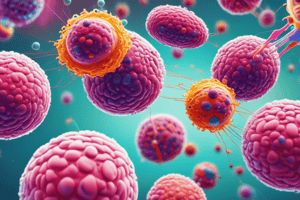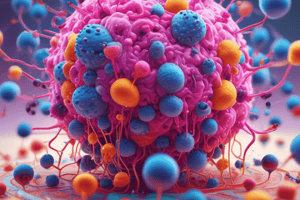Podcast
Questions and Answers
What is the main difference between active and passive immunity?
What is the main difference between active and passive immunity?
- Active immunity is acquired through natural exposure, while passive immunity is acquired artificially through vaccines.
- Active immunity only lasts for a few weeks, while passive immunity can last for the lifetime of the individual.
- Active immunity involves the body producing its own antibodies, while passive immunity involves receiving antibodies from an external source. (correct)
- Active immunity is only effective in children, while passive immunity is effective in adults.
Why does passive immunity only last for a few weeks or months?
Why does passive immunity only last for a few weeks or months?
- Passive immunity is not as effective as active immunity.
- The received antibodies do not match the individual's immune system.
- The received antibodies are broken down quickly by the body. (correct)
- The body's immune system becomes dependent on the received antibodies.
What is the result of active immunity?
What is the result of active immunity?
- The immune system produces antibodies in response to a disease or vaccine. (correct)
- The body becomes temporarily dependent on externally provided antibodies.
- The immune system becomes weakened and unable to fight infections.
- The individual becomes more susceptible to diseases.
Why are polysaccharide vaccines commonly conjugated to inactivated proteins?
Why are polysaccharide vaccines commonly conjugated to inactivated proteins?
What is the purpose of conjugating bacterial polysaccharides to a protein in vaccines for patients with weak immune systems?
What is the purpose of conjugating bacterial polysaccharides to a protein in vaccines for patients with weak immune systems?
Which vaccine contains purified capsule polysaccharide from 23 most common isolates of S. pneumoniae?
Which vaccine contains purified capsule polysaccharide from 23 most common isolates of S. pneumoniae?
What is the benefit of mRNA vaccines compared to other types of vaccines?
What is the benefit of mRNA vaccines compared to other types of vaccines?
What is the main component of Novavax COVID-19 vaccine?
What is the main component of Novavax COVID-19 vaccine?
What are common local side effects of vaccines?
What are common local side effects of vaccines?
When are vaccines contraindicated?
When are vaccines contraindicated?
What is the goal of mass immunization strategy?
What is the goal of mass immunization strategy?
Which vaccine type uses a modified version of a virus to trigger an immune response?
Which vaccine type uses a modified version of a virus to trigger an immune response?
What is the main benefit of DNA vaccines?
What is the main benefit of DNA vaccines?
Which vaccine type contains pieces of the virus that causes COVID-19?
Which vaccine type contains pieces of the virus that causes COVID-19?
Which vaccine covers 90% of S. pneumoniae isolates and is used every five years for persons at risk?
Which vaccine covers 90% of S. pneumoniae isolates and is used every five years for persons at risk?
Which vaccine type acts like a natural infection and is good at teaching the immune system how to fight germs?
Which vaccine type acts like a natural infection and is good at teaching the immune system how to fight germs?
Which type of immunity can be acquired by natural means?
Which type of immunity can be acquired by natural means?
What is the purpose of adjuvants in vaccines?
What is the purpose of adjuvants in vaccines?
Which type of vaccine contains killed microorganisms or inactivated viruses?
Which type of vaccine contains killed microorganisms or inactivated viruses?
What occurs when a sufficient proportion of a population is immune to an infectious disease?
What occurs when a sufficient proportion of a population is immune to an infectious disease?
Which type of vaccine cannot replicate and often requires booster doses?
Which type of vaccine cannot replicate and often requires booster doses?
Which type of vaccine contains a weakened form of the pathogen that can replicate inside the host?
Which type of vaccine contains a weakened form of the pathogen that can replicate inside the host?
What is the purpose of artificial immunity sources in vaccines?
What is the purpose of artificial immunity sources in vaccines?
Which type of vaccine involves toxins treated to destroy the toxic part, retaining antigenic epitopes?
Which type of vaccine involves toxins treated to destroy the toxic part, retaining antigenic epitopes?
What do subunit vaccines utilizing pathogen components include?
What do subunit vaccines utilizing pathogen components include?
Which type of vaccine must be conjugated to an inactivated protein to evoke a response in people with weak immune systems?
Which type of vaccine must be conjugated to an inactivated protein to evoke a response in people with weak immune systems?
What is the primary function of vaccines?
What is the primary function of vaccines?
What is the role of RNA vaccines & viral vectors in the types of vaccines?
What is the role of RNA vaccines & viral vectors in the types of vaccines?
Flashcards are hidden until you start studying
Study Notes
Vaccines and Immunity: Key Facts
- Passive immunity can be produced inside or introduced from outside the body
- Natural immunity is acquired by natural means, while artificial immunity sources are given for a specific purpose
- Vaccines protect individuals directly and prevent spread in the population indirectly
- Herd immunity occurs when a sufficient proportion of a population is immune to an infectious disease
- There are five general types of vaccines: attenuated, inactivated, subunit, toxoid, and RNA vaccines & viral vectors
- Attenuated vaccines contain a weakened form of the pathogen and can replicate inside the host
- Inactivated vaccines cannot replicate and often require several booster doses
- Adjuvants enhance the immune response to antigens by providing "danger signals" to APCs
- Inactivated whole agent vaccines contain killed microorganisms or inactivated viruses
- Toxoid vaccines involve toxins treated to destroy the toxic part, retaining antigenic epitopes
- Vaccines utilizing pathogen components include subunit, recombinant, polysaccharide, and conjugate vaccines
- Some subunit vaccines must be conjugated to an inactivated protein to evoke a response in people with weak immune systems
Studying That Suits You
Use AI to generate personalized quizzes and flashcards to suit your learning preferences.




